
 Advice after Appomattox
by
Brooks D. Simpson (Editor); LeRoy P. Graf (Editor); John Muldowny (Editor)
Advice after Appomattox
by
Brooks D. Simpson (Editor); LeRoy P. Graf (Editor); John Muldowny (Editor)
 Black Reconstructionists
by
Emma Lou Thornbrough
Black Reconstructionists
by
Emma Lou Thornbrough
 Diary of Gideon Welles, Secretary of the Navy under Lincoln and Johnson
by
Gideon Welles
Diary of Gideon Welles, Secretary of the Navy under Lincoln and Johnson
by
Gideon Welles
 Gendered Strife and Confusion
by
Laura F. Edwards
Exploring the gendered dimension of political conflicts, Laura Edwards links post-Civil War transformations in private and public life. She illustrates how ideas about men's and women's roles within households shaped the ways groups of southerners--elite and poor, whites and blacks, Democrats and Republicans--envisioned the public arena and their own places in it. By using those on the margins to define the center, Edwards demonstrates that Reconstruction was a complicated process of conflict and negotiation that lasted beyond 1877 and involved all southerners and every aspect of life.
Gendered Strife and Confusion
by
Laura F. Edwards
Exploring the gendered dimension of political conflicts, Laura Edwards links post-Civil War transformations in private and public life. She illustrates how ideas about men's and women's roles within households shaped the ways groups of southerners--elite and poor, whites and blacks, Democrats and Republicans--envisioned the public arena and their own places in it. By using those on the margins to define the center, Edwards demonstrates that Reconstruction was a complicated process of conflict and negotiation that lasted beyond 1877 and involved all southerners and every aspect of life.
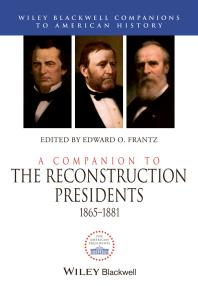 A Companion to the Reconstruction Presidents, 1865 - 1881
by
Edward O. Frantz (Editor)
A Companion to Reconstruction Presidents presents aseries of original essays that explore a variety of importantissues, themes, and debates associated with the presidencies ofAndrew Johnson, Ulysses S. Grant, and Rutherford B. Hayes. Represents the first comprehensive look at the presidencies ofJohnson, Grant, and Hayes in one volume Features contributions from top historians and presidentialscholars Approaches the study of these presidents from ahistoriographical perspective Key topics include each president?s political career;foreign policy; domestic policy; military history; and socialcontext of their terms in office
A Companion to the Reconstruction Presidents, 1865 - 1881
by
Edward O. Frantz (Editor)
A Companion to Reconstruction Presidents presents aseries of original essays that explore a variety of importantissues, themes, and debates associated with the presidencies ofAndrew Johnson, Ulysses S. Grant, and Rutherford B. Hayes. Represents the first comprehensive look at the presidencies ofJohnson, Grant, and Hayes in one volume Features contributions from top historians and presidentialscholars Approaches the study of these presidents from ahistoriographical perspective Key topics include each president?s political career;foreign policy; domestic policy; military history; and socialcontext of their terms in office
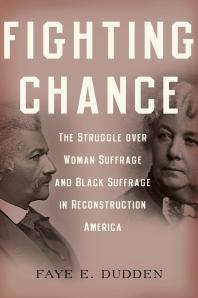 Fighting Chance
by
Faye E. Dudden
The advocates of woman suffrage and black suffrage came to a bitter falling-out in the midst of Reconstruction, when Elizabeth Cady Stanton opposed the 15th Amendment because it granted the vote to black men but not to women. How did these two causes, so long allied, come to this?Based on extensive research, Fighting Chance is a major contribution to women's history and to 19th-century political history--a story of how idealists descended to racist betrayal and desperate failure.
Fighting Chance
by
Faye E. Dudden
The advocates of woman suffrage and black suffrage came to a bitter falling-out in the midst of Reconstruction, when Elizabeth Cady Stanton opposed the 15th Amendment because it granted the vote to black men but not to women. How did these two causes, so long allied, come to this?Based on extensive research, Fighting Chance is a major contribution to women's history and to 19th-century political history--a story of how idealists descended to racist betrayal and desperate failure.
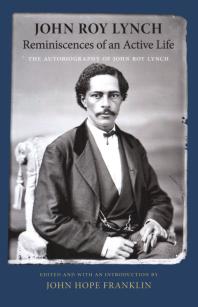 Reminiscences of an Active Life
by
John R. Lynch; John Hope Franklin (Editor)
Born into slavery on a Louisiana plantation, John Roy Lynch (1847-1939) came to adulthood during the Reconstruction Era and lived a public-spirited life for over three decades. His political career began in 1869 with his appointment as justice of the peace. Within the year, he was elected to the Mississippi legislature and was later elected Speaker of the House...
Reminiscences of an Active Life
by
John R. Lynch; John Hope Franklin (Editor)
Born into slavery on a Louisiana plantation, John Roy Lynch (1847-1939) came to adulthood during the Reconstruction Era and lived a public-spirited life for over three decades. His political career began in 1869 with his appointment as justice of the peace. Within the year, he was elected to the Mississippi legislature and was later elected Speaker of the House...
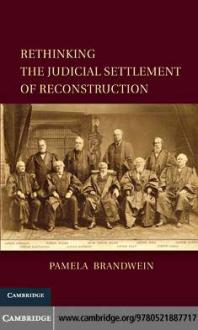 Rethinking the Judicial Settlement of Reconstruction
by
Pamela Brandwein
American constitutional lawyers and legal historians routinely assert that the Supreme Court's state action doctrine halted Reconstruction in its tracks. But it didn't. Rethinking the Judicial Settlement of Reconstruction demolishes the conventional wisdom - and puts a constructive alternative in its place. Pamela Brandwein unveils a lost jurisprudence of rights that provided expansive possibilities for protecting blacks' physical safety and electoral participation, even as it left public accommodation rights undefended. She shows that the Supreme Court supported a Republican coalition and left open ample room for executive and legislative action. Blacks were abandoned, but by the president and Congress, not the Court. Brandwein unites close legal reading of judicial opinions (some hitherto unknown), sustained historical work, the study of political institutions, and the sociology of knowledge. This book explodes tired old debates and will provoke new ones.
Rethinking the Judicial Settlement of Reconstruction
by
Pamela Brandwein
American constitutional lawyers and legal historians routinely assert that the Supreme Court's state action doctrine halted Reconstruction in its tracks. But it didn't. Rethinking the Judicial Settlement of Reconstruction demolishes the conventional wisdom - and puts a constructive alternative in its place. Pamela Brandwein unveils a lost jurisprudence of rights that provided expansive possibilities for protecting blacks' physical safety and electoral participation, even as it left public accommodation rights undefended. She shows that the Supreme Court supported a Republican coalition and left open ample room for executive and legislative action. Blacks were abandoned, but by the president and Congress, not the Court. Brandwein unites close legal reading of judicial opinions (some hitherto unknown), sustained historical work, the study of political institutions, and the sociology of knowledge. This book explodes tired old debates and will provoke new ones.
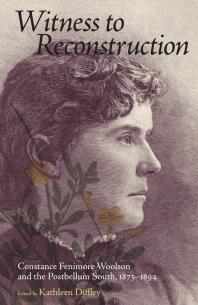 Witness to Reconstruction
by
Kathleen Diffley (Contribution by, Editor); Timothy Sweet (Contribution by); Anthony Szczesiul (Contribution by); Cheryl B. Torsney (Contribution by); Annamaria Formichella Elsden (Contribution by); Kevin E. O'Donnell (Contribution by); Carolyn Hall (Contribution by); Sharon Kennedy-Nolle (Contribution by); Michael Germana (Contribution by); Anne E. Boyd (Contribution by); Martin T. Buinicki (Contribution by); Janet Gabler-Hover (Contribution by); Caroline Gebhard (Contribution by); John Lowe (Contribution by); Geraldine Murphy (Contribution by); John H. Pearson (Contribution by)
In the wake of the Civil War, Constance Fenimore Woolson became one of the first northern observers to linger in the defeated states from Virginia to Florida. Born in New Hampshire in 1840 and raised in Ohio, she was the grandniece of James Fenimore Cooper and was gaining success as a writer when she departed in 1873 for St. Augustine. During the next six years, she made her way across the South and reported what she saw, first in illustrated travel accounts and then in the poetry, stories, and serialized novels that brought unsettled social relations to the pages of Harper's Monthly, the Atlantic, Scribner's Monthly, Appletons' Journal, and the Galaxy. In the midst of Reconstruction and in print for years to come, Woolson revealed the sharp edges of loss, the sharper summons of opportunity, and the entanglements of northern misperceptions a decade before the waves of well-heeled tourists arrived during the 1880s. This volume's sixteen essays are intent on illuminating, through her example, the neglected world of Reconstruction's backwaters in literary developments that were politically charged and genuinely unpredictable. Drawing upon the postcolonial and transnational perspectives of New Southern Studies, as well as the cultural history, intellectual genealogy, and feminist priorities that lend urgency to the portraits of the global South, this collection investigates the mysterious, ravaged territory of a defeated nation as curious northern readers first saw it.
Witness to Reconstruction
by
Kathleen Diffley (Contribution by, Editor); Timothy Sweet (Contribution by); Anthony Szczesiul (Contribution by); Cheryl B. Torsney (Contribution by); Annamaria Formichella Elsden (Contribution by); Kevin E. O'Donnell (Contribution by); Carolyn Hall (Contribution by); Sharon Kennedy-Nolle (Contribution by); Michael Germana (Contribution by); Anne E. Boyd (Contribution by); Martin T. Buinicki (Contribution by); Janet Gabler-Hover (Contribution by); Caroline Gebhard (Contribution by); John Lowe (Contribution by); Geraldine Murphy (Contribution by); John H. Pearson (Contribution by)
In the wake of the Civil War, Constance Fenimore Woolson became one of the first northern observers to linger in the defeated states from Virginia to Florida. Born in New Hampshire in 1840 and raised in Ohio, she was the grandniece of James Fenimore Cooper and was gaining success as a writer when she departed in 1873 for St. Augustine. During the next six years, she made her way across the South and reported what she saw, first in illustrated travel accounts and then in the poetry, stories, and serialized novels that brought unsettled social relations to the pages of Harper's Monthly, the Atlantic, Scribner's Monthly, Appletons' Journal, and the Galaxy. In the midst of Reconstruction and in print for years to come, Woolson revealed the sharp edges of loss, the sharper summons of opportunity, and the entanglements of northern misperceptions a decade before the waves of well-heeled tourists arrived during the 1880s. This volume's sixteen essays are intent on illuminating, through her example, the neglected world of Reconstruction's backwaters in literary developments that were politically charged and genuinely unpredictable. Drawing upon the postcolonial and transnational perspectives of New Southern Studies, as well as the cultural history, intellectual genealogy, and feminist priorities that lend urgency to the portraits of the global South, this collection investigates the mysterious, ravaged territory of a defeated nation as curious northern readers first saw it.

MOBIUS is a resource sharing library network that allows access to thousands of books, ebooks, media, and more! MOBIUS allows you to request materials from academic/public libraries all across the U.S.!
If you need a book which Spiva Library does not own, we can request a copy from another library using a service called InterLibrary Loan.
Before you place a request for a book, be sure to check MOBIUS. Books available through MOBIUS libraries can be requested by MSSU students, faculty and staff from the MOBIUS page.
This service is available to all MSSU students, faculty, alumni, staff and community card holders.
*a nominal service fee may
apply in some cases*
To access the full-text of ebooks from off-campus you must be a current MSSU student, faculty or staff member with a username and PIN. If you don't know or can't remember your Missouri Southern Username or PIN, please contact the IT Help Desk.
This site is maintained by the librarians of George A. Spiva Library.
If you have a question or comment about the Library's LibGuides, please contact the site administrator.